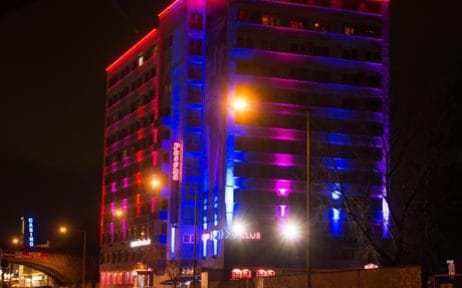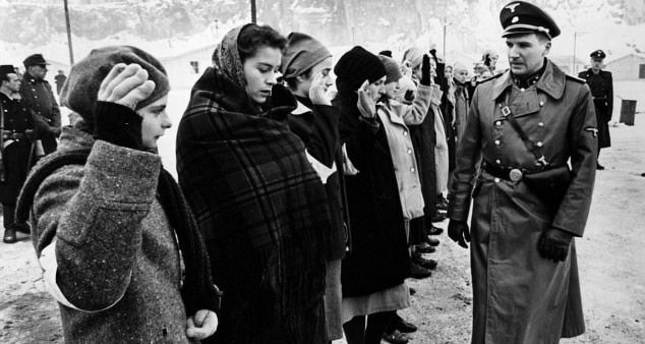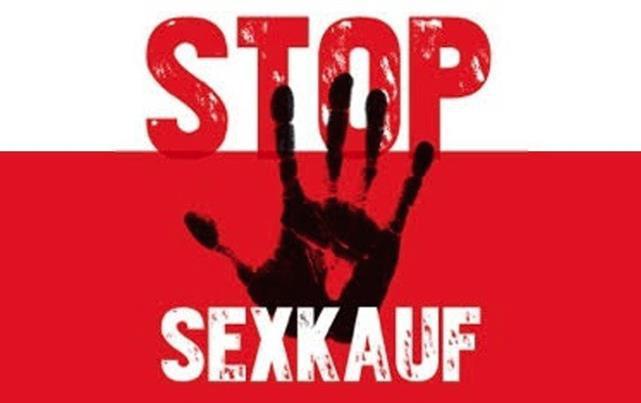Interview: The Ever Increasing Concentration of the Sex Industry in Germany
Francine Sporenda interviews Manuela Schon about the legalised sex industry in Germany and the impact of new regulations. Manuela is a sociologist and political activist in Germany. She co-founded “Abolition 2014 – Für eine Welt ohne Prostitution” and “LINKE für eine Welt ohne Prostitution.” She is a blogger at the radical feminist blog “Die Störenfriedas.”
Published on Nordic Model Now!
F: I’ve heard that 90% of the prostituted women in Germany are foreign, mostly from Eastern Europe and the Roma community. Can you tell me more about this and the trafficking networks which bring them to Germany?
M: First of all, there are no confirmed numbers for this. The figure of 90% is an estimate. But the very high proportion of foreign women is supported by the results of a brothel raid in the Bavarian city of Augsburg where they didn’t find a single German woman.
The sex industry lobby agree that at least 90% of the prostituted women in Germany are foreign. They call them “migrant sex workers” and frame prostitution as a good way for women coming from poor countries to make money.
The women mostly come from Romania, Bulgaria and Hungary; a lot from the Roma community and the Turkish Bulgarian minority. We find that many of them are from specific regions in those countries, because networks have developed in those areas and they bring the women to specific parts of Germany where they have connections with the sex trade networks there. If you look at the telephone numbers of these women, you can reconstruct the networks and see what country they come from, and/or which region in a particular country.
F: Do they only come from Eastern Europe, or are some from other places, like Africa?
M: We often read about women coming from Nigeria and we can see them in the adverts, but they are not a very big group. I cannot say if it’s growing. In my city, Wiesbaden, there are almost no African women. But we have quite a few prostituted women from Latin America, mostly trans.
F: I’ve heard there are chains of brothels in Germany, mega-brothels with hundreds of women in them. Can you tell me more about them?
M: The mega-brothels only became possible after the prostitution law that was passed in 2001 and implemented in 2002. Before that it was already legal to run a brothel. In fact, it’s not true to say that prostitution was legalized in 2002 because we’ve had brothels since the 19th century in many German cities. But it was owners renting out rooms, and they were not allowed to get involved in the prostitution itself, they were just landlords.
What the 2001 law changed was that it made pimps legal, and now they have more involvement. They still rent out rooms but also offer a whole range of “services” for the women. They can take care of the advertising; they provide cafeterias in the brothels where the women can eat; and hairdressers and salons where they can have their nails done. It’s a full service offering for the women, which means that they can stay in the brothels 24 hours a day. As a result, lots more of the money they make goes to the pimps.

It’s mainly German men who run these brothels. There are three main chains. Pascha, which started in Cologne 25 years ago, and now also has brothels in Munich, Stuttgart, and Salzburg, Linz and Graz in Austria. Then there is the Paradise chain, run by Jürgen Rudloff, who was recently arrested for human trafficking and tax fraud. There are Paradise brothels in Stuttgart, Frankfurt (am Main) and Graz in Austria. The owner of Pascha, Herman Müller was also arrested for human trafficking and tax fraud. And there is this weird person, Marcus von Anhalt…

F: Yes I heard about him. He is a kind of phoney German prince, isn’t he?
M: Yes. He has a conviction for human trafficking. He was adopted by the actress Zsa Zsa Gabor and her husband Frederik von Anhalt so he has this title of “prince.” He has more than 100 prostituted women “working” for him, and makes a lot of money.
F: Are these brothel chains on the stock market? Can you buy stocks in a brothel chain?
M: I haven’t heard about that, but it’s a possibility for the future.
F: Prostitution has always been in cahoots with organized crime. Legalization is often justified on the basis that the pimps running or owning brothels would be replaced by regular businessmen. Has organized crime been kicked out of the sex industry, or is it still involved?
M: What we can say for sure is that there are almost no prostituted women in Germany “working” from their own apartments and placing their own adverts.
When women enter prostitution on their own, they are usually quickly approached by pimps who tell them they need protection, and try to bring them under control. Even if the women are able to resist this and continue operating alone, they are still dependent on the prostitution apartments and brothels, the infrastructure known to sex buyers. So if these women want to be in prostitution, they have to rent a room in one of these places. We can confidently say that most of these apartments are under the control of such people.
In my city, there are about 70 of these apartments, which are run by six or seven people. Before the law change of 2002, they would have been labelled organized crime. But not any more – because what they are doing has been legalized.
We searched and found lots of connections between them and organized crime. There are multiple layers of organisation involved in prostitution: some bring the women from different countries, some advertise and sell them, there are lawyers for when the pimps get into trouble, etc. Lots of people contribute different things to the sex trade networks.

F: So you are saying it’s still the same shady people running the business?
M: Yes. There are people who are the official owners of these places, and they present themselves as regular businessmen who only do what they are allowed to, which is obviously not true if you look at the brothel owners I talked about earlier.
In the newspapers, we see articles about brothels that say all the women work in them freely, are independent and like what they do. And right next to that article, is another one about gang criminality, rape, drug and weapon dealings in the red light district, and how everyone knows the Hell’s Angels are involved in that, and in trafficking too. The two contradictory articles are juxtaposed but no connection is made between them.
We have done research on neo-Nazi involvement in prostitution and found connections, with a straight line to the people who committed the National Socialist Underground (NSU) murders.
F: We have noticed in France that “virtual brothels” – websites with thousands of adverts for prostituted women – are thriving. About two thirds of the prostitution in France is through these sites. Can you tell us about virtual brothels in Germany?
M: There is one big player, called RTO GmbH. It’s a company that runs advertisement sites like [www.]ladies.de, which is the main place men look for prostitution. I looked up their annual report and found their 2015 Internet business turnover was €15.3 million. This is just the earnings from advertisements and running web pages for brothels, etc.
But when a man chooses a woman from the thousands of ads on these sites, he still has to go to a physical venue.
F: It’s very profitable. In France posting a prostitution advertisement costs up to €800 per month. It’s a huge amount of money. So, if a site hosts 7,000 ads, it would bring in €5,600,000 per month.
M: Absolutely. And a lot of money (€10 million in one case) goes to lots of different people who work in the business. There are photographers who take the pictures, people who take care of the money, there are many different types of jobs involved. They usually charge about €200 per ad per week. There are ads for brothels as well as for prostituted women. The premium ads that show on top of the search pages are even more expensive. Today there are 10,863 ads listed. Another popular website, alongside a lot of smaller ones, is “Kaufmich” (Buy Me), which works in a similar way.
There is a site called Gesext, which is an auction platform, and auctions of prostituted women take place on it. It’s very shocking. Consider this: A woman can supposedly be in prostitution freely for economic reasons. She must pay rent of €150 a day for the room. The managers say that the women in the brothels are not forced to accept a particular punter, and they can refuse if they wish. But if you are auctioned, how can you say no to the guy who won the auction? How can you say, “He offered €200 but I don’t want him?” That’s simply not possible in practice.
Gesext had more than 100 million auction views and more than 10 million visitors in 2017 according to their website statistics. At this moment about 5,000 auctions are online, most are “sex dates” and the selling off of sexy lingerie ranks second.
F: That’s horrific. I didn’t know women could be auctioned like that.
New regulations were passed last summer in Germany, which outlawed things like flat rate deals and gangbangs, and specified that condoms must be worn by punters. Have these new rules been implemented, and can you tell me more about them?
M: A key change is that the local politicians running the city administrations are now responsible for prostitution. Previously they could wash their hands of it and say they didn’t have enough people to do anything about it, and it was none of their business anyway. So there was no one overseeing things. For example, in my city, there was just one person responsible for prostitution, but only 5% of his working time was allocated to it, which is nothing. In fact, if there was prostitution in my building and I complained, he would be obliged to take action, but because of lack of resources, he would not be able to actually do anything about it.
Now the city administration has to employ people to take care of any issues, which means they have to get involved and inform and educate themselves. This is one of the consequences of the law, and it’s a good thing.
Another good thing is that, in my city for example, the apartment brothels are 90% illegal, which means that most of them will have to close – or register. Many have already closed because they are not eligible to get a licence and as of January, the rest will close as well. But of course the brothel owners are trying to avoid this.
We have zoning regulations, which means that in some parts of the city prostitution is legal, and other parts it’s not. So in the areas where it’s prohibited, brothels are closing but they are moving to the areas where it’s allowed. This means that the small brothels will close, and big chains will take over. This will result in the monopolization of the prostitution market by a few players, the ones with big money, so I think overall the law is not helpful.
On the other hand, there was a lot of laughter about mandatory condom use. People asked who would check whether men are wearing condoms. And of course, it’s difficult to implement. But at least brothels cannot advertise for sex without a condom anymore. Before the recent changes, we had lots of adverts saying “Tabulos or alles ohne,” which means “all without.” Punters are afraid to talk about their experiences without condoms on the Internet now. There has already been one conviction of a sex buyer for having sex with a prostitute without a condom, and there was a newspaper report recently about a woman who reported a sex buyer who asked for service without a condom.
But the big problem now is that the German Federal Republic system means we have national laws that have to be implemented at the local and state levels. Even though the law was passed last summer, the federal government has not finished passing on the authority and money that would allow the lower level administrations to implement it. For example, the administration in my city wants to close down illegal brothels but they can’t because the state has not yet given them the authority. They are ready, but they can’t apply the law. There’s a big bureaucratic problem about who is responsible for what, who will fork out the money, and so the law is being sabotaged.
F: Why do you think prostitution is accepted so easily in Germany? How does it correlate to the power of patriarchy (male domination) in the country more generally?
M: The main thing is that prostitution has been legal and accepted for a long time in Germany. No one living in the country now has known a time when prostitution was illegal here. Like I said earlier, there were brothels in the 19th century, and prostitution has always been part of German society. So it’s a big part of socialization. It’s considered normal and it’s accepted. For as long as I can remember in the 35 years I have been alive, there has never been a discussion about prostitution not being a part of society.
In Germany, there is continuity from the Nazi era, and we remember the Holocaust. There are lots of documentaries and books about that time in our history. But we don’t usually talk about the brothels run by the Nazis for the SS and the Wehrmacht, or even for the prisoners in the concentration camps. And if we do talk about it, it’s very similar to the standard discourse on prostitution now. It’s claimed the women applied voluntarily to work in the brothels, it was a normal thing to do, the women wanted to do it and they were never forced. So we can see a denial of the reality of this dark side of our history that mirrors the denial of what is happening now.

And of course, we can see also how it affects every woman in this country. If I compare going to a bar in Germany with going to one in Sweden, there is a huge difference. If I go to a bar in Sweden, I can stay there with my friends all night, without being harassed. Nobody comes over and sits at our table without asking. But if I go to a bar in Germany, men are totally annoying. They sit at your table without being invited and talk to you without asking if you are interested. And women in Germany tend to see that as normal.
They don’t understand that it doesn’t happen everywhere. There’s a lot of talk along the lines of, “Yes we have a problem, we are sexually harassed by men, but we’re happy that prostitution exists so we don’t have to have sex with them because they can go to brothels.” I have heard that so many times.
F: Is it acceptable in Germany for men to talk openly about going to brothels? Or is it something men don’t talk about, at least when women are around?
M: It depends. There are men who have partners, and of course they would not say that in company. But if you look at discussions about prostitution on social media, there are lots of men who say, “Yes I do it, and it’s OK. I’m a sex buyer, and there’s nothing wrong with it.”
We have this huge male culture of men going to brothels together. You can see it in the red light districts, groups of men going into brothels. It’s standard practice. In talk shows, there are people who are prominent, who are stars, who say, “There’s nothing wrong with it.”
When we started our activism and were invited to debates, the first people who raised their hands when we were asked why we were against prostitution were male sex buyers. And they would say, “I’m different, I don’t agree with you.” But that has changed a bit in the last two or three years. I think our activism has led to an increase in the stigmatisation of the buying of sex.

F: That’s great your activism has had such an impact. You created the organisation “Abolition 2014” with the aim of getting the legalization reversed. How influential is the abolitionist movement in Germany? Does it have political allies?
M: When we started, we wanted to learn from the French and they had an organisation called “Abolition 2012.” At that time, we could see that the abolitionist effort in France was going to be successful. So we thought now is the time for Germany to take over from France and do the same. The members of “Abolition 2014” are all women. They come from different political parties, mainly the Social Democrats, Left and Greens. There are survivors of prostitution, and women from different backgrounds working with prostituted women, such as social workers. But all call themselves feminists, because it’s important for us to have a feminist analysis in our criticism of prostitution.
And since there was almost no critical information on prostitution in Germany when we started, we translated texts that were available in other languages, to provide basic information for people so they could debate on social media. There was really nothing like that in Germany before then. We were the only ones on social media saying these things and we had to say them over and over. After a while, we realized that some change was happening, people we’d never heard about started sharing our texts. So we could finally lean back and let other people share the work. At first, we spent lots of time on the Internet, mostly participating in discussions.
But now we can do other things because we don’t have to always step in. Like when the new law was discussed, we sent a lot of letters to the members of the national Parliament. Then we found that during the debates in Parliament, a number of parliamentarians repeated word for word the arguments we’d sent them. Even if we never got a reply or a thank you for our contribution or for writing to them, we could see that they had read what we had written, and that it had changed how they thought about prostitution.
We could see that there was a growing movement and on the one hand, it’s great, but we fear that the core of the arguments is being lost because not all of them are feminists. When people don’t have a feminist approach, they use only parts of our arguments and leave out other parts. So we have to make sure that we are still there in the discussion to bring in the feminist framework. Because there is a range of people who are against prostitution but maybe for different reasons. So we have to make sure that they don’t control the debate so people realize that the abolitionist standpoint is the feminist standpoint. So that’s a thing we have to think about now.
There’s been a new documentary on a public TV channel, a really big one. It was gratifying, because when they started, they didn’t know anything about the Nordic model and were in favour of prostitution. It was supposed to be 45 minutes but the journalist was so impressed when he did his research, he extended it to 90 minutes. And it was abolitionist and recycled our activism. We could see it was our research. That was a big milestone, and now more and more journalists are critical of prostitution.
We can say it’s a craftwork thing, because the more you come to the local level, the more politicians agree with us. But the higher you go, for example, to the state or national level, there are fewer and fewer politicians who agree with us. But a growing number are getting on board in different parties. For example in our “Left against Prostitution” initiative in the Left party, there are a growing number of local politicians, and a few state and national ones as well. So there is definitely a growing number of politicians that agree with us.
One thought on “Interview: The Ever Increasing Concentration of the Sex Industry in Germany”